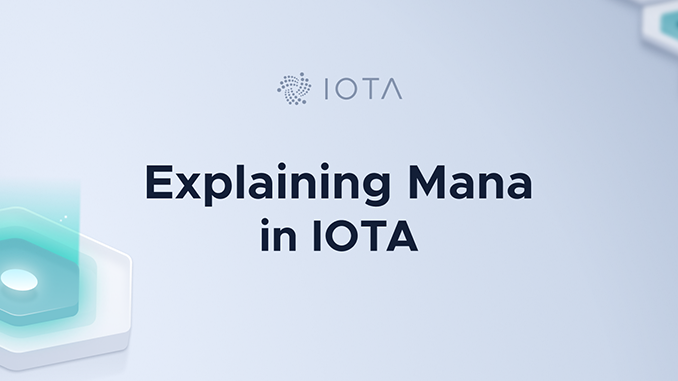
IOTA intends to abolish the central coordinator in 2021, which also means introducing a new principle in the validation of transactions. Mana is to play a central role in this. Now IOTA explains in more detail what Mana means in practice.
IOTA has a special position among the crypto-currencies through free transfers, which is often emphasized as an advantage. This mechanism is achieved by the fact that individual network participants must confirm two other transactions in each case if they want to carry out their own. However, each transfer is ultimately approved by the central coordinator, who is operated by the IOTA Foundation like a kind of Super Node. With the switch to IOTA 2.0 aka Coordicide planned for 2021, the central coordinator is to be abolished – and thus a new consensus system for the validation of transactions must also be created. In this context, IOTA now dedicates a blog post to Mana and explains how Mana should work as an extra token in IOTA 2.0.
Decentralized IOTA and the role of Mana
Mana is designed by IOTA as a token, which serves as an important indicator of whether a node acts reliably and honestly in transactions. With a reputation system for nodes, IOTA wants to achieve a lean, resource-saving protocol for consensus building. Previously, it was announced that each transaction from (M)IOTA to Coordicide would also contain the same amount of mana and distribute it to the node that confirms the transfer. For the IOTA Foundation, developer William Sanders now reports that there are also discussions about linking the distribution of mana to how active a node is. According to Sanders, the decision on the exact calculation method for mana has not yet been made and will depend on which approach proves more robust in tests.
But isn’t mana then basically a copy of Delegated Proof-of-Stake (DPoS), a block chain protocol used, for example, in EOS? There, for nodes that are selected as reputable by network participants, there are coins as fees for the work of validation. Sanders says there are parallels between DPoS and mana, but they are very limited. First problem: Mana is actually also a reward for nodes, but is not intended to provide a monetary incentive. Second problem: If a node accumulates a lot of mana, it automatically attracts the validation of many transactions because its reputation is good. If this node switches to dubious behavior, the IOTA network could be compromised.
Lau Sanders is supposed to find mechanisms to solve these problems. First, Mana and IOTA remain separate tokens. Secondly, IOTA Foundation and other honest network participants would always hold more mana than a single node with fraudulent intentions. Thirdly, it would be very expensive to get mana by purchasing IOTA, because increased demand would drive the price. Sanders also says that no secondary market for Mana is expected. On the other hand, Sanders also admits that mana may be lent or sold through Smart Contracts. This would be interesting because when the network load of IOTA 2.0 is high, transactions that are willing to use more mana should be prioritized.
Conclusion: Mana in IOTA 2.0 raises questions
Mana sounds harmless in itself at IOTA and the IOTA Foundation continues to promise that for most users, mana will not play a role in everyday life, but will function automatically in the background. A critical look at the function of mana also allows to raise doubts whether IOTA is not introducing fees for bank transfers through the back door with mana. Is it really as clear as IOTA thinks that Mana will not create its own monetary market? This will probably only become clear on the long road to IOTA 2.0 in testnets and so there will be time to readjust the concept if necessary. Meanwhile, the crucial question remains: Nodes should provide computing capacity for the validation of external transactions. Why should they do this, when mana as a reward for the service has no monetary value and at the same time the IOTA Foundation wants to get rid of the role of a central coordinator.
Best place to buy Bitcoin and IOTA:

Leave a Reply